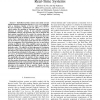511 search results - page 76 / 103 » Analysis of Multi-Organization Scheduling Algorithms |
217
Voted
UPP
2004
Springer
15 years 8 months ago
2004
Springer
Evolving solutions rather than computing them certainly represents an unconventional programming approach. The general methodology of evolutionary computation has already been know...
94
Voted
INFOCOM
2006
IEEE
15 years 8 months ago
2006
IEEE
— Instantaneous Fair Sharing (IFS) is a traditional network ideal prescribing to share the network capacity among competing applications fairly during any infinitesimal time int...
94
Voted
ICMCS
2010
IEEE
15 years 3 months ago
2010
IEEE
In many scenarios, such as TV/radio advertising production, animation production, and presentation, music pieces are constrained in the metric of time. For example, an editor want...
95
Voted
ANOR
2007
15 years 2 months ago
2007
The min-SHIFT DESIGN problem (MSD) is an important scheduling problem that needs to be solved in many industrial contexts. The issue is to find a minimum number of shifts and the...
104
Voted
IJES
2006
15 years 2 months ago
2006
Embedded real-time systems must satisfy not only logical functional requirements but also para-functional properties such as timeliness, Quality of Service (QoS) and reliability. W...


